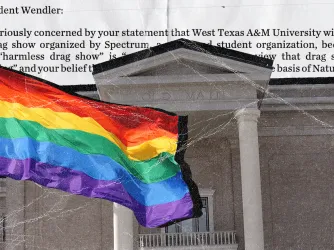Table of Contents
AAUP Issues Open Letter to Yale, Criticizes Singapore Campus
This week, the American Association of University Professors (AAUP) issued an open letter to Yale University "to express the AAUP's growing concern about the character and impact of the university's collaboration with the Singaporean government in establishing Yale-National University of Singapore College." FIRE has written about this issue in recent months, and we support the efforts of the AAUP to ensure that Yale University respects the academic freedom rights of its faculty and students, both on American soil and abroad.
The AAUP's letter lays out the situation:
Some Yale administrators have argued that they have no choice but to obey the laws of another country, but if the laws are odious—such as criminalizing sexual orientation—the relevant choice is whether to collaborate with the country that espouses them.
We agree. Yale's decision to open this new campus abroad raises serious questions regarding academic freedom, freedom of expression, shared governance, and more. The AAUP's letter usefully lists many of the outstanding issues:
We believe Yale also needs to establish appropriate and genuinely open forums in which the academic and political implications of the new campus can be reviewed, discussed, and modified as necessary. Among the many issues that might be reviewed are these:
(a) what are the political implications of Yale's decision to assist the Singapore government in achieving greater financial strength and cultural legitimacy through the establishment of the new campus?
(b) what risks to students and faculty are inherent in forms of campus speech, from Internet postings and email messages to broadcast lectures, that may be critical of the government, its laws, and its officials, including members of the Singapore judiciary?
(c) will all faculty, staff, and students of Yale-NUS (including Singaporean nationals) be guaranteed immunity from prosecution for defamation or sedition for writings or statements that would be protected under the provisions of the UNESCO Recommendation concerning the Status of Higher Education Teaching Personnel?
(d) will the other protections called for in the UNESCO Recommendation concerning the Status of Higher Education Teaching Personnel be implemented on the Singapore campus?
(e) will all faculty, staff, and students of Yale-NUS (including Singaporean nationals), as well as the institution's libraries, be exempt from all restrictions on importation of publications or periodicals?
(f) will independent Internet access—not subject to Singapore's firewalls or to its monitoring systems—be guaranteed for all members of the Yale-NUS community?
(g) can Yale-NUS community email be protected from government surveillance, even if email is sent unencrypted?
(h) will the right to invite speakers to campus be compromised by restrictions on visitors to Singapore?
(i) what risks to students, staff, and faculty with various sexual orientations are posed by Singapore's laws?
(j) what may the impact on free speech on campus be of any surveillance protocols put in place by Singapore authorities?
(k) what policies could Yale put in place to ameliorate educational problems arising from the political self-censorship that pervades Singapore society?
(l) will Yale seek to address, even overcome, the separation between academic freedom in the classroom and limits to political speech both on and off-campus in Singapore?
(m) do employees at Yale-NUS who are not American citizens face working conditions that would be unacceptable in the United States?
(n) how will working conditions for non-American citizens be monitored and reported to members of the Yale community?
(o) will American faculty teaching at the Singapore campus be assured the protections for academic freedom and shared governance embodied in AAUP's Policy Documents and Reports that faculty have in New Haven?
(p) under what, if any, conditions violative of academic freedom or human rights would Yale consider it appropriate and necessary to withdraw from its Singaporean partnership?
Unfortunately, Yale has so far made the wrong choices in laying out its goals for international education. We look forward to seeing Yale's response to the AAUP's timely and useful letter.
In contrast, Duke University recently commented on its goals for a campus in Kunshan, China, promising to operate its campus abroad in a way more consistent with principles of academic freedom and free expression:
Students and faculty at the new campus — currently under construction and now scheduled to welcome students sometime next year — "will have complete freedom of academic inquiry," [Executive Vice Chancellor Mary] Brown-Bullock said.
Nevertheless, she told the council that she didn't want to "soft pedal" any concerns they had about academic freedom, particularly potential restrictions on access to the Internet by the Chinese government.
If that happened, Brown-Bullock said, the university has "backup plans in place" for those on the campus to connect to the Internet remotely through Duke's own network.
We at FIRE hope all American universities expanding abroad take seriously their academic freedom obligations—indeed, their very raison d'être.
Recent Articles
Get the latest free speech news and analysis from FIRE.

The findings against Harvard are a blueprint for a National Campus Speech Code

VICTORY! 5th Circuit blocks West Texas A&M’s unconstitutional drag ban

Wide-ranging coalition of 'friends of the court' continue to support citizen journalist Priscilla Villarreal in her return to the Supreme Court
